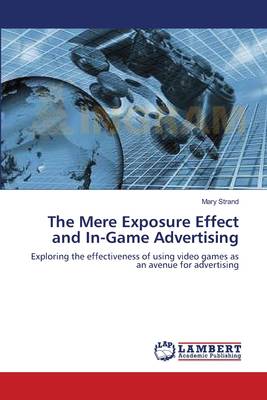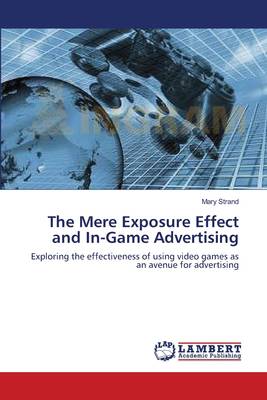
Je cadeautjes zeker op tijd in huis hebben voor de feestdagen? Kom langs in onze winkels en vind het perfecte geschenk!
- Afhalen na 1 uur in een winkel met voorraad
- Gratis thuislevering in België vanaf € 30
- Ruim aanbod met 7 miljoen producten
Je cadeautjes zeker op tijd in huis hebben voor de feestdagen? Kom langs in onze winkels en vind het perfecte geschenk!
- Afhalen na 1 uur in een winkel met voorraad
- Gratis thuislevering in België vanaf € 30
- Ruim aanbod met 7 miljoen producten
Zoeken
The Mere Exposure Effect and In-Game Advertising
Exploring the effectiveness of using video games as an avenue for advertising
Mary Strand
Paperback | Engels
€ 84,45
+ 168 punten
Omschrijving
This work explores the effectiveness of the use of in-game advertising for persuasion. The theory of Mere Exposure was used to develop the method and frame the data collection and analysis. For purposes of data collection, 143 participants (73 experimental, 70 control) played a video game that was either modified to expose them to an advertisement or left unmodified. Participants then completed questionnaires regarding recall, product liking, game liking, and video game experience. Statistical analysis showed that placing an advertisement within a video game generates recall of the product or brand embedded. The use of in-game ads, however, did not influence liking of the brand. In addition, there was no correlation between recall and level of experience of the participant. Finally, there was no conclusive evidence of a correlation between liking of the game itself, and liking of the product featured in the game.
Specificaties
Betrokkenen
- Auteur(s):
- Uitgeverij:
Inhoud
- Aantal bladzijden:
- 152
- Taal:
- Engels
Eigenschappen
- Productcode (EAN):
- 9783659384431
- Verschijningsdatum:
- 6/05/2013
- Uitvoering:
- Paperback
- Afmetingen:
- 150 mm x 220 mm
- Gewicht:
- 231 g

Alleen bij Standaard Boekhandel
+ 168 punten op je klantenkaart van Standaard Boekhandel
Beoordelingen
We publiceren alleen reviews die voldoen aan de voorwaarden voor reviews. Bekijk onze voorwaarden voor reviews.









